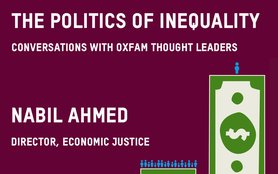Mother’s Day provides a bittersweet moment for caregivers and their communities. How do we salute the women who make it all possible? Flowers? Kitchen gadgets? Burnt toast in bed? After this catastrophic year, that seems like pretty weak tea. How about a package of transformative change instead?
It took a global pandemic to lay bare the bones of our economy and society, and to reveal the essential infrastructure that holds it together: Care work. And to appreciate how much women do to make it all possible, from caring for children and the elderly to home schooling to cooking to cleaning to providing emotional and economic support, in the home and in the workforce.
This Sunday, the marketing forces that be would like us to show our appreciation with tokens like flowers or chocolates. But the women who do the unpaid or underpaid care work that helps our society and economy function deserve more. A lot more.
Women provide our social safety net, doing the care work that makes all other work possible.
Care is just as essential as roads and electric grids to the functioning of our society. In fact, the unpaid care women take on—worth $11 trillion per year—sustains the economy.
Women are bearing the brunt of the pandemic. Women of color are doing it all.
COVID-19 has had a catastrophic impact on countless women, who sacrificed careers, and mental and emotional wellbeing, to care for children, relatives, neighbors, and whole communities.
In the US, women have lost over 4.6 million net jobs since February 2020 (men lost 3.8 million), wiping out decades of progress. Some of this was sectoral: COVID-19 hit jobs in the service, food, and hospitality sectors particularly hard. Overnight, millions of women lost their positions.
In addition, millions of women dropped out of the workforce due to increased care duties, when schools and child care facilities closed abruptly. Due to the gender pay gap and traditional gender roles, it was women who became full-time caregivers. (Prior to the pandemic, women in the US were already spending 37% more time on unpaid care work than men.)
Black and Latina women took the biggest hits on both counts. They saw the most jobs losses (in child care, hospitality, restaurants), and have been the worst off overall throughout the pandemic. White women have bounced back in the job market at a faster rate than Black and Latina women.
In other words, though lack of support for our care system and care givers has always been rooted in sexism and racism, the pandemic has thrown into sharp relief the reality that unpaid and underpaid care is a racial-justice issue.
Celebrate Mother’s Day with transformative policy reform
This Mother’s Day, we’re calling on lawmakers to honor women by passing much-needed legislation, a critical first step to addressing gender inequality and supporting women and their families.
The American Jobs and Families Plans
In the American Jobs Plan, the Biden-Harris administration is signaling that it is listening to advocates who have argued for decades that care is a crucial element of infrastructure.
The American Families Plan brings together policies that Oxfam and our partners have been pushing for. It contains:
- Paid family and medical leave that will enable workers to take time off from work to care for themselves and their loved ones without risking their jobs.
- Extended refundable child tax credits from the American Rescue Plan, putting cash directly into families’ pockets.
- Universal pre-K for three- and four-year-olds.
- Affordable child care, ensuring that families do not have to pay more than seven percent of their income on care.
- Increased investments in underpaid child care workers, which will provide a $15 minimum wage and professional development opportunities.
In addition, Oxfam applauds several bills moving in Congress:
- The Child Care for Working Families Act will provide low- and middle-income families with affordable child care and guarantee child care workers a living wage.
- The FAMILY Act guarantees a permanent 12-week paid family and medical leave program.
- The Universal Child Care and Early Learning Act calls for $700 billion to establish a universal child care system, while also investing in child care workers.
- The Building an Economy for Families Act would permanently extend the American Rescue Plan’s child tax credit and provide paid family and medical leave.
The World Economic Forum has estimated that before the pandemic, it would have taken 99.5 years to close the global gender gap; now, it will take 135.6 years.
It’s clear that we need to help women recover from the effects of the pandemic—but it’s not enough to return to the status quo. We need to rebuild our economy, but this time with racial and gender justice at its core.
So, sure, buy a mother a treat for Mother’s Day. But then let your elected officials know you’re counting on them to do much, much more.
Sign this petition to call on Congress to ensure affordable, quality childcare is accessible to all. Thanks, and Happy Mother's Day!



